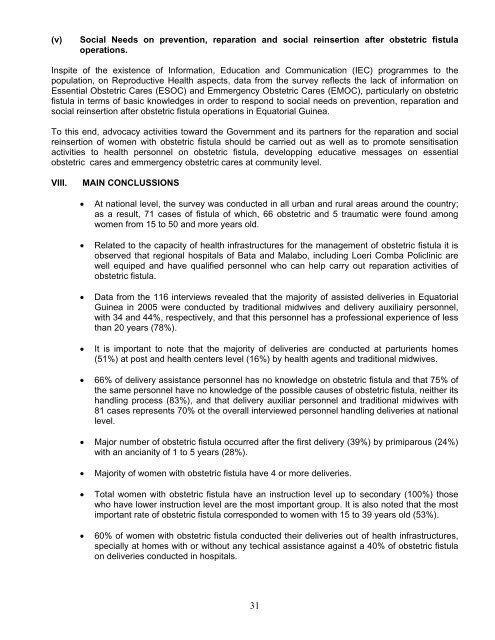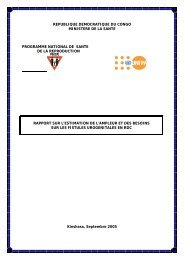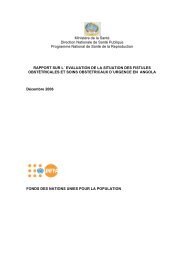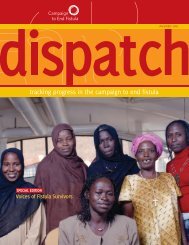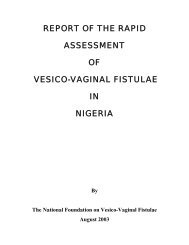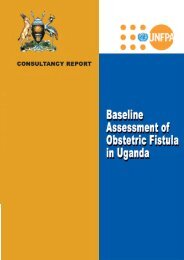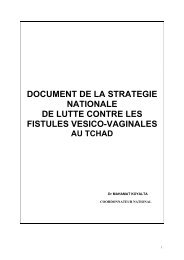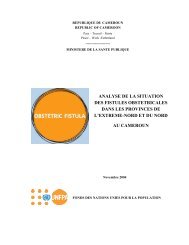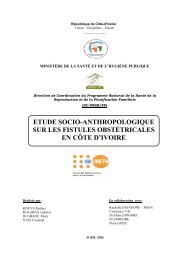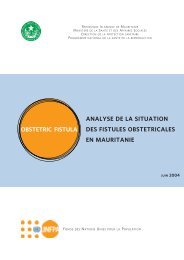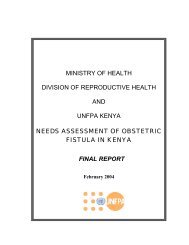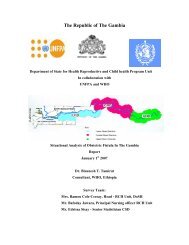Equatorial Guinea - Campaign to End Fistula
Equatorial Guinea - Campaign to End Fistula
Equatorial Guinea - Campaign to End Fistula
You also want an ePaper? Increase the reach of your titles
YUMPU automatically turns print PDFs into web optimized ePapers that Google loves.
(v)<br />
Social Needs on prevention, reparation and social reinsertion after obstetric fistula<br />
operations.<br />
Inspite of the existence of Information, Education and Communication (IEC) programmes <strong>to</strong> the<br />
population, on Reproductive Health aspects, data from the survey reflects the lack of information on<br />
Essential Obstetric Cares (ESOC) and Emmergency Obstetric Cares (EMOC), particularly on obstetric<br />
fistula in terms of basic knowledges in order <strong>to</strong> respond <strong>to</strong> social needs on prevention, reparation and<br />
social reinsertion after obstetric fistula operations in <strong>Equa<strong>to</strong>rial</strong> <strong>Guinea</strong>.<br />
To this end, advocacy activities <strong>to</strong>ward the Government and its partners for the reparation and social<br />
reinsertion of women with obstetric fistula should be carried out as well as <strong>to</strong> promote sensitisation<br />
activities <strong>to</strong> health personnel on obstetric fistula, developping educative messages on essential<br />
obstetric cares and emmergency obstetric cares at community level.<br />
VIII.<br />
MAIN CONCLUSSIONS<br />
• At national level, the survey was conducted in all urban and rural areas around the country;<br />
as a result, 71 cases of fistula of which, 66 obstetric and 5 traumatic were found among<br />
women from 15 <strong>to</strong> 50 and more years old.<br />
• Related <strong>to</strong> the capacity of health infrastructures for the management of obstetric fistula it is<br />
observed that regional hospitals of Bata and Malabo, including Loeri Comba Policlinic are<br />
well equiped and have qualified personnel who can help carry out reparation activities of<br />
obstetric fistula.<br />
• Data from the 116 interviews revealed that the majority of assisted deliveries in <strong>Equa<strong>to</strong>rial</strong><br />
<strong>Guinea</strong> in 2005 were conducted by traditional midwives and delivery auxiliairy personnel,<br />
with 34 and 44%, respectively, and that this personnel has a professional experience of less<br />
than 20 years (78%).<br />
• It is important <strong>to</strong> note that the majority of deliveries are conducted at parturients homes<br />
(51%) at post and health centers level (16%) by health agents and traditional midwives.<br />
• 66% of delivery assistance personnel has no knowledge on obstetric fistula and that 75% of<br />
the same personnel have no knowledge of the possible causes of obstetric fistula, neither its<br />
handling process (83%), and that delivery auxiliar personnel and traditional midwives with<br />
81 cases represents 70% ot the overall interviewed personnel handling deliveries at national<br />
level.<br />
• Major number of obstetric fistula occurred after the first delivery (39%) by primiparous (24%)<br />
with an ancianity of 1 <strong>to</strong> 5 years (28%).<br />
• Majority of women with obstetric fistula have 4 or more deliveries.<br />
• Total women with obstetric fistula have an instruction level up <strong>to</strong> secondary (100%) those<br />
who have lower instruction level are the most important group. It is also noted that the most<br />
important rate of obstetric fistula corresponded <strong>to</strong> women with 15 <strong>to</strong> 39 years old (53%).<br />
• 60% of women with obstetric fistula conducted their deliveries out of health infrastructures,<br />
specially at homes with or without any techical assistance against a 40% of obstetric fistula<br />
on deliveries conducted in hospitals.<br />
31


